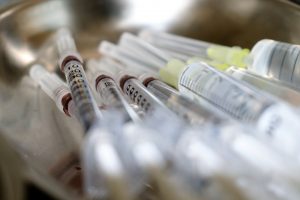Indonesia has kicked off an ambitious plan to vaccinate up around 181.5 million people against COVID-19 within a year, with the country’s President Joko “Jokowi” Widodo receiving the first dose of a Chinese-made vaccine.
Earlier this week, Indonesia authorized emergency use of the coronavirus vaccine developed by Chinese firm Sinovac Biotech, becoming the first country outside China to give its CoronaVac shot the regulatory green light.
“Based on the data and considering the guidance from [the World Health Organization], CoronaVac has met the requirements to get the permit to use the vaccine,” Penny Lukito, the head of Indonesia’s Food and Drug Monitoring Agency (BPOM), told a news conference on January 11.
Jokowi’s decision to get the first dose was intended to instill confidence ahead of the mass vaccination drive to come. As the Indonesian president explained on social media, “It’s not about putting myself first, but to ensure everyone that this vaccine is safe and halal.”
Around 1.3 million health workers are expected to follow suit next month, before the inoculations are offered to public servants and members of the general public. Indonesia currently has the highest death toll and infection rate from COVID-19 in Southeast Asia.
The Indonesian government’s approval came after interim results from Phase III clinical trials being conducted at Bandung in West Java showed an efficacy rate of 65.3 percent. While this is relatively low compared to competing vaccines under development in the United States and Europe, BPOM said the Bandung results were still higher than the 50 percent efficacy threshold set by the World Health Organization.
“The CoronaVac vaccine has shown it can form antibodies that can kill and neutralize the virus,” Lukita of BPOM said. “It has fulfilled the requirements to be granted emergency use authorization.”
Indonesian authorities also took into consideration clinical trial data from Brazil and Turkey, which have also hosted Phase III clinical trials of Sinovac’s vaccine. Brazil’s Instituto Butantan said last week that the vaccine was 78 percent effective in “mild-to-severe” cases of COVID-19. However, on January 13, the same day that Jokowi received his inoculation, Brazilian researchers revised that figure down to just 50.4 percent, after including the results from “very mild” cases of the virus. Turkish authorities announced an efficacy rate of 91.25 percent.
These divergent numbers will no doubt prompt concerns within Jokowi’s government, which has bet heavily on vaccines to head off an intensifying outbreak of the disease. On January 12, the country reported a daily record of 302 coronavirus deaths, taking its total death toll to 24,645, alongside 846,765 total confirmed cases. Its infections are currently averaging more than 9,000 a day, though many experts believe that even this could understate the true spread of the disease, given the paucity of testing and tracing efforts.
After reacting slowly in the early months of the pandemic, and making sporadic efforts to track and contain the virus in the months since, Indonesia has gone all-in on immunization as a strategy for defeating the virus. Over the past few months, Jokowi’s government has signed deals to secure about 330 million doses of COVID-19 vaccine in total, including 125.5 million from Sinovac, and smaller batches of the Pfizer, Moderna, and AstraZeneca vaccines.
Unusually, Indonesia will focus on vaccinating its working-age population (those aged 18 to 59) first in the hope that it can quickly reach herd immunity fast and revive the economy, which late last year entered recession for the first time since the Asian Financial Crisis of 1997-98. Most other nations that have begun vaccinations are giving priority to elderly people, who are more vulnerable to COVID-19.
Part of the reason is that while the Pfizer/BioNTech vaccine appears to work well in people of all ages, the Sinovac vaccine has only been proven to work on those aged 18-59. During its Phase III trials in Bandung, none of the 1,640 volunteers was over the age of 59.
The Indonesian government is thus embarking on a high-risk strategy to defeat COVID-19 and return the country to some degree of normality. It depends on the vaccines being effective enough to curb the spread of the virus, and that the antibodies produced by the vaccines will last. It also assumes that the decision to prioritize working-age people will prove the shortest route to herd immunity. To succeed, nearly everything will have to go right from here.













